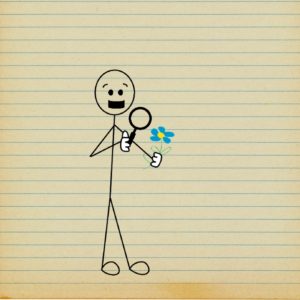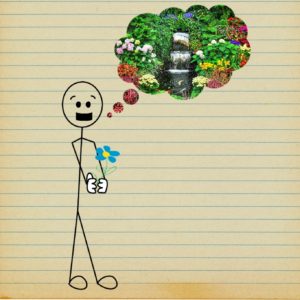Load Newsreader Bold Font
Today we're going to be looking at the second letter in your type, represented by an “S” for “Sensing” or an “N” for “iNtuition” (the letter “I” was already taken by Introversion). This is a fascinating topic, but it can also be a strangely complicated one to understand, so let's dive in and see what we're able to do with it.
Sensing and intuition, in the most basic terms, have to do with how you take in information. As their names imply, sensors take in information through their senses, and intuitives take in information through their intuition. Buuuut, those are just words. What we really need…are stick figures.
Essentially, a sensor is doing this:
Sensors use their five senses to take in information about the world around them. They start with the details and work towards the big picture. They are interested in what things are, and they use the information they gather to build on knowledge they already have. They try to make new information fit into their existing framework of understanding, like a new piece fitting into a partially-finished puzzle. They value what has worked in the past and they can sometimes be resistant to change.
Meanwhile, intuitives do something more like this:
Intuitives are out-of-the-box thinkers who use their intuition to think more about what something could be. Of course intuitives use their five senses as well, because our bodies and brains are all designed to do that, but they're interested in more than just what their senses tell them. They start with the big picture and work back to the details. They have more of a future orientation, and so as they take in new information they use it to shine a light on where they're headed. They live in a world of possibilities and tend to embrace change.
This impacts so many of our conversations. There are going to be plenty of times that you may just look at another person and wonder if the two of you are even living on the same planet, because you're taking in the same information but evaluating it differently. You may look at a puppy and call it an adorable gift to the world and the other person looks at it and calls it a hairy slobbery nuisance. You're both looking at the same thing at the same time in the same place, and yet you're seeing two different things.
Granted, in this puppy example there are a great many other factors that could contribute to these opinions. Maybe you never had a puppy growing up and always wished you had. Maybe the other person had an abundance of puppies and they were out of control and pooped everywhere and slobbered on everything and barked all night long. Those would be good and legitimate reasons to have those respective opinions.
But maybe neither of you have any experience to speak of when it comes to puppies. Or maybe you have the exact same experiences, and you're still arriving at those different conclusions. An intuitive type may see the adorableness of the puppy, and think about dogs being man's best friend, and remember how much they loved reading Where the Red Fern Grows, and see forward to all the happiness and companionship a puppy will provide. A sensing type may see and smell and hear and feel the current sloppiness and noisiness of the puppy and think about all the times they've visited houses with dog hair on the furniture and dog smell in the air and dog feet excitedly pawing at everyone, and they just see a mess they don't want to deal with.
The point of the puppy example is simply that two people can look at the same thing and call it different things, without any dishonesty involved. The puppy is adorable. The puppy is a slobbery nuisance. Both of those perceptions are true. In casual conversation that's not a big deal, but when something important is being discussed, those differences in perception can cause serious conflict. It's where that feeling of speaking two different languages comes from, and why it's so important to learn to speak the other person's language, and when that is still not helping, to respectfully agree to disagree.
What does this look like in your businesses and friendships and families? What are the practical implications of understanding this?
Some thoughts for sensors:
Not all change is bad. Don't fear it, don't be a victim of it, don't assume those who encourage it are out to get you. Help shape it, and also ask the hard questions about whether a change is good or bad. If you're in a group of intuitives, who tend to be dreamers, it's important for your voice to be heard.
Learn to trust the gut instincts of the intuitives in you life. There are exceptions to this rule, but most of them are more logical than you may realize. Hearing an intuitive say “I just really think this is going to work” may not instill much confidence in you. But if you were to press them on this point, most have an underlying logical process that is causing them to make statements like that. Because of their future orientation, they themselves may have a hard time pausing to evaluate what that logical process is, but it's usually there. So learn to trust them, and if you're still struggling with that, ask them to share their process. Open up good dialogue between you and the intuitives in your life.
Give yourself opportunities to dream. Find what inspires you, whether it's books or music or nature or traveling, and take hold of that inspiration. Use it to pursue change that excites you.
But also accept how you're wired. If you're a sensor, you're not going to be the person exploding with ideas at blue-sky brainstorming sessions, so try not to feel frustrated when that's not you.
Also, we live in a world that seems to value a forward-thinking mentality, but the reality is that the majority of people are sensors (around 70%), so don't feel marginalized when marketing and media campaigns are all telling you to embrace with open arms the latest and greatest things.
And in your business, take your wiring into account when you're considering your branding and your clientele. If you're a sensor, you may very well want to run a business that has more of a classic feel, or that at least incorporates elements of familiarity. Branding that is super hip or unusual or edgy is probably not going to sit right with you, and if your personality is at odds with your branding, that can feel inauthentic and prevent you from really coming alive in your work.
Some thoughts for intuitives:
Not all change is good, either! Keep dreaming and trailblazing, but avoid change for change's sake. If you're always pursuing change, even when it's unnecessary, you may begin to undermine your influence.
Recognize that the sensors in your life may feel the need for you to prove yourself, at least where those gut instincts are concerned. Because there are plenty of people who have “bad” gut instincts, going on that alone probably won't be enough for most sensors, at least early in your relationship with them. But as they repeatedly see those instincts pan out, trust will come.
In the meantime, be willing to focus on the details. Help the sensors in your life embrace change by making the way forward more clear. You can do this by drawing attention to times that similar ideas have worked in the past, or by explaining contingency plans, or by mapping out what the first few steps towards the goal may be.
All that being said, please keep your ideas coming. Intuitives are visionaries, and because change often is necessary, we need intuitives to cheerfully and competently lead the way forward. So keep dreaming and innovating and working hard to make things better.
Definitely keep your wiring in mind in your branding and how your run your business. If you value being unique or original or contemporary or cutting edge, you want your clients to know that about you.
Some thoughts for everyone:
A classic bride who wants a traditional wedding and lots of classy, subdued portraits is going to be looking for one kind of photographer, and a geek chic bride who's having her wedding in a re-purposed warehouse and doesn't want a single posed photo is going to be looking for another kind of photographer altogether. There's a good chance that first bride needs a photographer who's a sensor who values tradition and history, and the second one needs a photographer who's an intuitive who values originality and thinking outside the box. Photographers who try to cater to both kinds of brides aren't doing themselves or their clients any favors. Learn what your style is and who you click with, because you will do better work when you are playing to your strengths.
And remember: When it comes to sensing and intuition, neither is better. Just like we talked about with introversion and extraversion, the world needs both. As you learn to understand your own wiring better, recognize that you are surrounded by people who truly are wired in the opposite way. If you fear change, recognize that there are those who truly love it. If you hate doing what's been done before, realize that there are those who thrive on doing what's been done before. If you look at a flower and see the petals and leaves, know that there are those who see the garden the flower came from. Conflict will arise on this point, but if we're really trying to understand each other more accurately, then we can help each other see the world in deeper, richer, better ways.

Hi, I'm Elisa, the other half to Showit CEO and Owner Todd Watson. While you may not often find me in the Mothership, I am frequently to be found doing other things behind the scenes--brainstorming and dreaming and collaborating with Todd and other members of the team, writing and editing company material, and hosting our team or friends of the company for various events, to name a few. I love this company, I love our team, and I love the people Showit has given me the opportunity to cross paths with. I am a mother to four smart, funny, kind and amazingly chill boys. I love good storytelling of all sorts, from books to blogs to television to movies to music, which has translated to a love of writing as well. I am an ISFJ, and I'm just gonna let this definition I came across explain what that means. 🙂 "The undyingly loyal friend who reminds you of your grandmother, but in a good way. As in, they regularly bake you cookies and are always down for a relaxing night in." I hope someday we get to meet, and I'll bake you some cookies!


